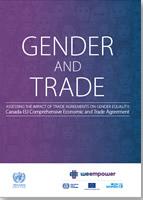
This Policy Brief was developed jointly by UNCTAD and the United Nations Entity for Gender Equality and the Empowerment of Women (UN Women) under the WE EMPOWER – G7 programme funded by the European Union and jointly implemented with the International Labour Organization and UN Women.
The impact of trade and trade policies is shaped by the structure of markets and institutions and the gender inequalities that are embedded within them. Trade policies and agreements influence the opportunities of women and men to access secure and decent employment and to benefit from international trade.
Braunstein (2017) highlights the two-way causality between gender equality and economic growth:1 Economic growth affects gender equality in many ways, but gender biases also influence macroeconomic outcomes, such as growth, trade, imbalances and inflation. According to Fontana (2014 and 2016), the gendered structure of markets has two main implications for the way gender and trade interact in a country. Firstly, gender inequalities will affect trade strategies for competitiveness, and secondly, inequalities will affect whether trade reforms actually translate into desired economic outcomes.
Trade policies developed with a gender perspective can help overcome gender inequalities by opening new opportunities for employment and prosperity. Robust measurement of the impacts of trade helps us understand the differing affect it has on women and men. Limited numbers of women entrepreneurs trading internationally, fewer opportunities for women to participate in trade -related jobs, and high levels of unemployment can have a serious and detrimental impact on the economy, leading to lower consumption, higher poverty and declining wellbeing of women, men and their families.
This policy brief considers the gender dynamics of trade agreements and how to measure them from an “intersectional lens” – looking at the differing and sometimes multiple injustices often faced by different groups of women. The brief builds on a framework to understand the impact of trade agreements on gender equality and women’s full participation in the economy. It is intended to inform statisticians, trade policymakers, negotiators and academics, among others, about the importance of measuring the impacts of trade agreements on gender equality and women’s economic empowerment.
To set the issues in context, the brief focuses on gender and trade issues relevant to Canada and the European Union, and recommendations are applied specifically to the Canada–European Union Comprehensive Economic and Trade Agreement (CETA).




